William Wainwright - An Elusive Conjuror
“Wainwright arrived in the Colony a convict about 8 years ago, is now free, but has no certain place of residence at present; and, therefore respectfully suggest that he should not be granted the indulgence which he seeks.”
William Wainwright is a difficult man to trace and identify. His known career as a performer extends over a period of just seven years, after which he disappears from view. Most of the information we can glean comes from his letters to the Colonial Secretary, requesting a license to perform; there is a need to draw some conclusions from relatively sparse clues, and to hope that further details will eventually come to light. His main claim to fame seems to be a short season of performances in conjunction with Powell Courtier in 1849.
Although there is only a little to be said of Wainwright as a performer of magic, his interactions with authority give an insight into the challenges facing an entertainer under colonial rule.
Clues to Wainwright’s Origins
 The most helpful clue to Wainwright’s identity comes from the quotation above. On June 1, 1842, he had written to the Colonial Secretary, Sir Edward Deas Thomson, seeking a license to present theatrical performances including ‘Fantoccini’ (puppetry). This was required by law, and substantial penalties existed for non-compliance (in the case of dramas, a £50 penalty for every breach). The Secretary also required a supporting recommendation from the local judicial authorities. (1)
The most helpful clue to Wainwright’s identity comes from the quotation above. On June 1, 1842, he had written to the Colonial Secretary, Sir Edward Deas Thomson, seeking a license to present theatrical performances including ‘Fantoccini’ (puppetry). This was required by law, and substantial penalties existed for non-compliance (in the case of dramas, a £50 penalty for every breach). The Secretary also required a supporting recommendation from the local judicial authorities. (1)(2) For permission to exhibit Fantoccini &c.
To the Hon. E.D. Thompson Esq.
The undersigned humbly solicits your Honor for a Colonial License to shew the [Fantoccini] with other performances for which he will feel most grateful and thankful. An answer addressed to the care of Mr Sutton at Mrs [Martins?] Parramatta St will oblige your Honr - most obt. humble servt. William Wainwright, Sydney 1st June 1842
[Parramatta Street would later become George Street West, and then Broadway]
Thomson requested the Superintendent of Police for Sydney, William Augustus Miles (3) to enquire and report. On June 10, Miles responded:
Recommending refusal of License to W. Wainwright for exhibition of Fantoccini &c. - Police Office 10th June 1842
I have the honor to acknowledge the receipt from your office of an application from an individual named William Wainwright for a License to exhibit Fantoccini and other performances and in attention to your request noted thereon beg leave to report that Wainwright arrived in the Colony a convict about 8 years ago, is now free, but has no certain place of residence at present; and, therefore respectfully suggest that he should not be granted the indulgence which he seeks.
I have the honor to be, Sir, your most obedient servant, Will. Aug. Miles
The Honorable the Colonial Secretary Sydney. / Herewith returned.
The Honorable the Colonial Secretary Sydney. / Herewith returned.
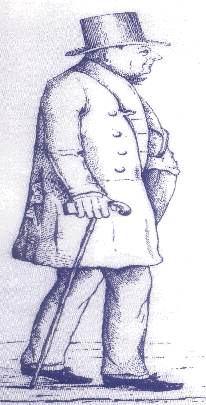
And with that, the Colonial Secretary appended:
“Under this report permission cannot be granted [signature]” Wainwright inf[ormed]
<< W. A. Miles
We have, then, some means of tracing Wainwright. He was, like two other of our earliest performers (Thomas ‘Mons. Du Pree’ Amott and John Powell Courtier) a former convict. If he had arrived in the Colony around 1834 or 1835, and served one of the most common terms of transportation, seven years, he is likely to have been given his Certificate of Freedom very close to the date in 1842 on which he applied for a performing license. Consideration needs also to be given to the fact that some of the letters addressed to the Secretary were in the name ‘William Wright’.
The difficulty is that the name of Wright, or Wainwright (derived from the occupation of wagon builder) was extremely common, and a search of Old Bailey court records discovers multiple cases of these names being transported to New South Wales; in fact, some 79 William Wrights can be found in convict records.
It becomes more reliable to investigate the Certificates of Freedom (4) granted in 1842, and one name stands out as a strong candidate, though we cannot be entirely certain that this was the same man. William Wainwright was given his Certificate of Freedom on May 9, 1842 (just a month before his application letter). He had been transported to Australia, departing in March 1835 and arriving July 5 aboard the Marquis of Huntley. His court appearance had been at (Lancaster) Liverpool Quarter Sessions, October 20, 1834, and his Certificate records the crime as ‘stealing plates’. The sentence was for seven years. (5) His notes as a convict state that he was assigned to work for a Dr. Graham at Raymond Terrace, and was a native of Manchester, a labourer aged 23 (born 1812), 5ft 11 ½ inches tall with sallow complexion, fair hair, and brown eyes. The record also notes, “Absconded in Dec. 1839.”
Another record (6) has him assigned to Richard Windeyer at Tomago House, also at Raymond Terrace (Hunter region, New South Wales)
Another record (6) has him assigned to Richard Windeyer at Tomago House, also at Raymond Terrace (Hunter region, New South Wales)
If we have, as is most likely, identified the correct Wainwright, we have at least a picture of his background. The other, though small, corroborating evidence is that Wainwright would later promote himself as being ‘late of the Theatre Royal, Liverpool’ which connects him to that city, even if his claim is dubious. It is worth noting that, as with ex-convict magicians Amott and Courtier, Wainwright’s convict history did not stand in the way of him being accepted into Australian colonial society after he was freed.
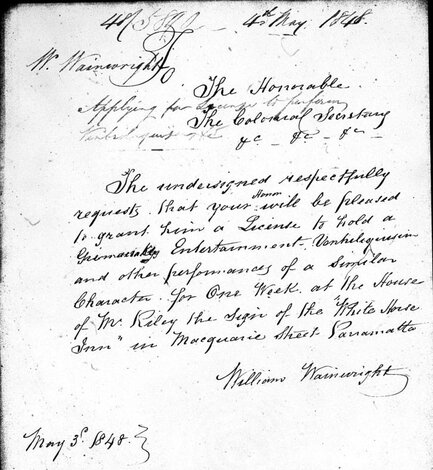
Wainwright as a Magician - 1843
Despite his initial rejection, Wainwright did not give up, and the next known application for a license was written from Liverpool (on the outskirts of Sydney) on April 5th 1843.
“To the Honourable the Colonial Secretary Sydney
Honoured Sir, with your kind permission being inclined to perform a series of feats in the above mentioned town such as Legerdemain Ventriloquism and Gymnastic feats with a variety of other amusements of the stage I most humbly beg you will grant me a license for the space of fourteen days to perform at Mr. Arundelles the Cottage of Content Inn, by so making you will greatly oblige Your most obedient Servant William [looks like Weinwright].”
Secretary’s Response – “Let a License be made out for Legerdemain Ventriloquism and Gymnastic feats. April 6.”
The ‘Cottage of Content Inn’ (7) was founded about 1812 and was one of Liverpool’s earliest hotels, lasting until 1875.
Mr. Thomas Arundell operated a gunsmiths’s workshop next to the Cottage of Content Inn in Liverpool (on what is now the corner of Elizabeth and George Streets ) from 1839, and he was the 1843 publican of the ‘Cottage’. Arundell also held the 1844 license for Liverpool’s ‘Wheelwright’s Arms’ and others such as The Hope and the Railway Inn.
By 1848 Thomas was reported insolvent as a “blacksmith and innkeeper formerly of Liverpool”, and he was buried in 1860 at the Liverpool Pioneer Memorial Park. With his wife, Sarah, Thomas Arundell had a number of convicts working in his smithing workshop, and family folklore says that Sarah would wash the convicts’ wounds and give them clean clothes to wear; so for an ex-prisoner the Arundells may have been a friendly environment for Wainwright to begin a career.
By 1848 Thomas was reported insolvent as a “blacksmith and innkeeper formerly of Liverpool”, and he was buried in 1860 at the Liverpool Pioneer Memorial Park. With his wife, Sarah, Thomas Arundell had a number of convicts working in his smithing workshop, and family folklore says that Sarah would wash the convicts’ wounds and give them clean clothes to wear; so for an ex-prisoner the Arundells may have been a friendly environment for Wainwright to begin a career.
These local inns were typical of the venues available to itinerant magicians of the time. Used as lodgings, eating houses and community meeting places, even as offices for official inquests, a performer might find a ‘long room’ to host an evening of entertainment, while the audience ate, drank and smoked. It would have been a robust and noisy environment, profitable to those who could get their audience on side. Likewise, these sorts of performances would not, in general, have been advertised in the newspapers, but relied on a few handbills and local word-of-mouth. Wainwright, in all likelihood, played many small venues about which we know nothing, and may well have ‘passed the hat’ for his income.
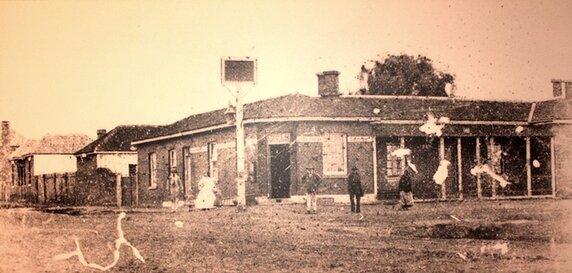
Cottage of Content, Liverpool, 1860s
Having successfully applied for one license, Wainwright wrote again just a week later (April 12), requesting to perform at the public house of Mr. Robert Smith, the Cricketers’ Arms at Windsor (built in Fitzgerald-street, 1839) , this time for a period of fourteen days. Here, he established a template for future requests:- “…performances to consist of Legerdemain, Ventriloquism and Gymnastic Feats” which in later letters would include the words “feats … of a similar character”. This letter also seems to be signed as Weinwright. Because the local Police Office had appended a note advising that they were not aware of any objection, the Colonial Secretary granted the license.
Relatively little is known of Wainwright’s repertoire. In later years he seems to have conjured with mostly small apparatus and we are left to assume that he was also the ventriloquist. Whether he was also a gymnast might be queried; brief mention is given to a Mr. Thomson, and in 1849 to an otherwise unknown Signor Sherbot, “the celebrated Posture Master and Tumbler will appear this evening on the Roman Candlestick, standing on his head while the swivel is in motion, and discharge a brace of pistols. He will throw a variety of somersaults and other feats of agility.” So it seems that on occasion Mr Wainwright was accompanied by other performers.
Wainwright was not always able to obtain the performing license that he sought. Applying on June 10 1843, to appear at Mr Clarke’s [Charles Miller Clarke] ‘Bucks Head’ in West Maitland, he neglected to obtain the recommendation of the Police Magistrate, and Secretary Thomson refused his license.
1844 - Mr. Wright
On applying from Penrith on April 30, 1844, to play at Mr. Matthew’s ‘Kentish Arms’, the commentary from the Police Office said “I know no objection to the application on the other side [of this letter] unless the Provision in the second section of the Act of 9 Geo 4th 1828 [this was “An Act for regulating places of public exhibition and entertainment” - 9 Geo. IV No. 14, 1 September 1828 - requiring the Colonial Secretary’s consent] restrains such performance taking place in a public house although with a license; as it appears to me to be intended by it, to prevent any such performance in a public house.” This would have been bad news for any itinerant performer, had the Secretary decided to set a precedent. Fortunately, he wrote, (May 2) “Let the license be made out. The act of Council it has been decided by the [Court?] Law officers, does not prevent the issue of one for a public house.”
It is notable that during 1844, but at no other time, Wainwright was signing his name as William Wright, for reasons not known; but his use of the standard phrase “Legerdemain, Ventriloquism and Gymnastic Feats” confirms that they were the same person.
Wright/Wainwright was approved for a full month’s license on May 6, and returned to Liverpool at another of Mr Arundell’s hotels, the ‘Wheelwright’s Arms’ in Macquarie Street. Before this license expired, he again wrote the Colonial Secretary on May 21, requesting that “you would be pleased to allow such performances to take place at the room of Mr. [Abraham] Davis, York Street Sydney, agreeably to Act of Council, for the term of a fortnight.”
Secretary Thomson, who was in that role for almost twenty years since 1837, unfortunately had a strict rule and refused this request, saying “I regret that I cannot grant him a license for the purpose asked for within any part of the City of Sydney.” (May 25). Presumably there was a greater concern that inner-Sydney was more likely to harbour audience members of a more dubious and unruly character (and, quite likely, women of ill repute).
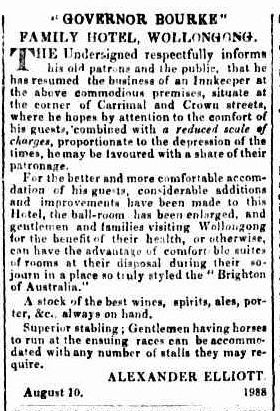
Further difficulties arose when, on June 22, 1844, the magician applied for a license to appear for a fortnight at the house of Mr. James Greenfield, the ‘Queen’s Arms Inn’ at Narellan.
The response of the Police Magistrate referred back to the intention of the Council Act.
[Microfilm records have truncated this text] - “ I take the liberty to ... considering the .. Geo 4th 920/14 to have ... both the ... to prevent ... of a theatrical nature from ... at Public Houses. I have ... recommend the applicants refused .. favourable consideration of the Col. Secretary. Although I am bound to add that I am informed it is the practice to conduct such performances in ... detached from the [?] public house and not to permit the sale of any fermented liquors in them during the performances, they are conducted upon the premises of the Publican & can ... to occasion [reason] for disorderly conduct.”
This concern for possible disorderly conduct led the Colonial Secretary to change his earlier views, and he wrote, “I regret that under the report I cannot grant the License asked for.” (June 24)
The last known letters from 1844 were between July 4 and 30, in which Wainwright advised that he had temporarily moved to Appin, south-west of Sydney. With a slight delay to obtain a local approval for performances in Wollongong (further south), he was given a license for Mr. Cameron’s Bourke Hotel in Appin, Mr. Alexander Elliott’s Governor Bourke Family Hotel, [Kennedy’s] Hotel, and Mr. Samuel Coulston’s Wollongong Hotel, all in Wollongong for a period of one month. He tacked on some single nights in nearby Dapto and Jamberoo, as well as the racing season in August. For all that, no printed announcement of performances has been found.
Touring 1846 - 1849
For the year 1845 there is no information discovered, and it is not until June 1846 that Mr. Wainwright resurfaces.
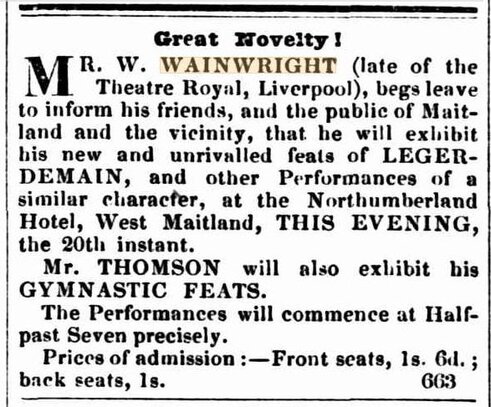
In the Maitland Mercury & Hunter River General Advertiser, Saturday June 20, 1846, is found an advertisement, the first known print advertisement, announcing a single performance of “new and unrivalled feats of LEGERDEMAIN and other Performances of a similar character” at the Northumberland Hotel, West Maitland. He was with a Mr. Thomson who was to perform the gymnastics .The unsubstantiated claim is made that Wainwright is “late of the Theatre Royal, Liverpool”. There is no followup commentary from the newspaper to confirm that a performance took place.
Since Wainwright should have held a license for this performance, it seems that not all of the letters addressed to the Colonial Secretary have been indexed or discovered. It is not until September that another letter is found, which gives several interesting insights to the Maitland trip.
September 18, 1846
Wm Wainwright Applying for License to perform tightrope dancing &c.
Sir, I most respectfully solicit your permission to perform Tightrope dancing, Gymnastics and Ventriloquism, for two nights namely Saturday the 26th and Tuesday the 29th instant, at the licensed house of Mr. Charles Hurford, known as the Prince of Wales Hotel*, situate the corner of Jamieson and George Streets Sydney. [*The Prince of Wales’ Feathers]
I have held several Licenses for Country Districts and I regret to say have sustained a great loss thereby, I am now induced to apply for your sanction to enable me to exhibit tightrope dancing Gymnastics and Ventriloquism in Sydney, in order to enable me to discharge some very pressing debts.
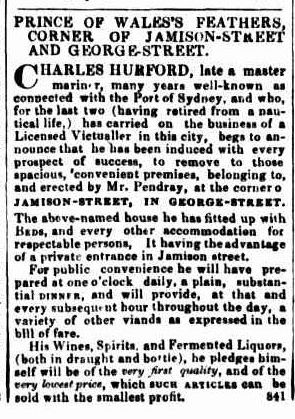 I most respectfully beg leave to remark that in no instance, where you have been pleased to grant me a license, have I ever been charged with disorder or any infringement of the Police laws.
I most respectfully beg leave to remark that in no instance, where you have been pleased to grant me a license, have I ever been charged with disorder or any infringement of the Police laws.Having sustained a heavy pecuniary loss, by my exhibition at Maitland, caused by the Conveyance and support of my Company, the receipts in no way meeting my disbursements or enabling me to discharge their just claims, I therefore most respectfully and earnestly entreat that you will be pleased to allow me the application I now apply for, and pledge myself that the greatest possible order and decorum shall be enforced.
I am, Sir, with great Respect, Your most humble and obedient servant, William Wainwright.
>> I beg respectfully to recommend this application (signed) [Macdonald?]
Response – “I greatly regret that having invariably refused Licenses for the City of Sydney, except for the [main] Theatres, it is not in my power to comply with the present application. 19th Sept.”
It seems, then, that Wainwright may have obtained some broader permission to work in the country districts, probably performed more than once in Maitland, and was travelling with a ‘company’ which perhaps was no larger than himself and Mr. Thomson. Either way, without permission to perform in the city, he subsided once more into obscurity and presumably found some other way to make ends meet.
However in March 1848, the Colonial Secretary received another letter from Wainwright, accompanied by a certificate from the magistrates at Bathurst NSW (the letter exists, but the certificate is not held in the Secretary’s files, sadly). He was asking for permission to perform at the Red Lion Inn but on this occasion he strayed from his template request for “Legerdemain, Ventriloquism and Gymnastic Feats” and instead requested approval for “the Dramatic performance named in the enclosed certificate.” (March 9) >> Approved. License herewith for signature. License dated 14th March. Transmitted to Mr. Wainwright 15th March 1848.
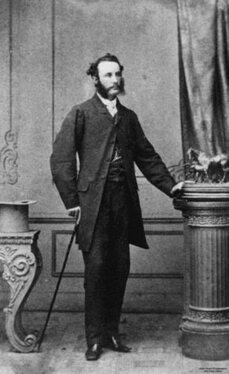
J. T. Morriset >>
Several weeks later, the Secretary received an enquiry from Mr. James Thomas Morriset, Police Magistrate for Bathurst, in high dudgeon over Mr. Wainwright’s performances:-
“Police Office Bathurst, 24th March 1848 [The Honorable The Colonial Secretary]
About three weeks ago a person named in the margin [of this letter] applied to this Bench for a recommendation to an application about to be made by him to you for the issue of a License to perform gymnastic and conjuror’s tricks. At a full meeting of all the Justices of this Bench his application was disapproved of by the majority. I now learn that since this refusal Wainwright has applied to you, and obtained, a License for Dramatic performances, to be exhibited at the Red Lion Inn, at which place he is exhibiting jugglers and conjurors tricks instead of Dramatic performances as mentioned in the license. Knowing that you are always very particular in the issue of these licenses, I do myself the honor to enquire for the satisfaction of the Bench, on what, and whose, recommendation Wainwright succeeded in obtaining his license, as I feel satisfied he has imposed upon you in his application. I beg also to observe that the exhibitions are attended by the lowest blackguards in the place, and that the Red Lion Inn is a most disorderly kept public house, and one not likely to be relicensed at the approaching annual Licensing Meeting. I have the honor to be, Sir, Your most obedt Servant, J.T.Morriset P.M. - P.S. The license particularly mentions the Red Lion Inn, which is nothing but a small Public House. P. M.”
The Secretary’s response was “Transmit to him the Certificate of the Magistrates which induced me to issue the license” and this was done the following day. Since the license was sent away to Bathurst, it is no longer held in the Colonial Secretary’s correspondence, and we are unable to guess just how Mr. Wainwright managed to wangle his certificate of recommendation. It is understood that James Thomas Morriset (after whom the Newcastle suburb was named) was known to be difficult on the subject of theatrical performers, but it must be noted that the Red Lion Inn was still going strong in 1862!
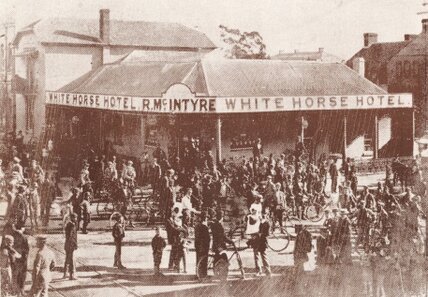
In May 1848, Wainwright applied successfully to perform for a week at Parramatta’s White Horse hotel in Macquarie Street, and soon afterwards for a month in the southern town of Goulburn. He advertised performances at the Chequers Inn. The performance of July 1 was said to be his ‘farewell benefit’ during which he “will exhibit a great variety of trick in the Cabalistic Art, together with a Sailor’s Hornpipe and Comic Dance.” The night before his benefit, he had entertained under the auspices of the Odd Fellows, in aid of funds for the new hospital. “The attendance was both numerous and respectable, and they appeared highly pleased with the evening’s amusements.” He raised £4.7s. which surely endeared him to the community; and by August 12 he was still at Goulburn, performing at Mr. Long’s Caledonian Hotel. The Goulburn Herald reported that Wainwright acquitted himself to the satisfaction of his audience.
Even this extension of his time in Goulburn was not without controversy. A single magistrate, W. H. Hovell, wrote on his application for extension, (July 3) “As it appears to be the wish of the inhabitants of this place, that the applicant should continue his performance for a time longer, I see no objection to the renewal of the application. ” But the Colonial Secretary made an annotation, “This should be brought before the full Bench” and sent the application back to Goulburn where it was finally approved by five members of the bench.
William Hilton Hovell, J.P., the member of that famous Australian exploring duo, Hume and Hovell, had his nose put out of joint by the Colonial Secretary’s return of the magician’s application. On July 21 he wrote to the Secretary:-
“Sir, In reference to Mr Wm. Wainwright’s first application to hold public exhibitions in this town, you will find that, that application was signed by one Magistrate only, Chas. Lockyer Esq.
As a Magistrate I refused to attach my signature, not knowing the character of the man or the wishes of the inhabitants on the subject - but - on his second application, when I discovered that his conduct was peaceable, that his performances were approved of by the respectable portion of the inhabitants and that the proceeds of one night’s performance, £6-10 were added to the funds of the Goulburn Hospital, I considered I could not do less than accede to his request. A first application having been signed by one magistrate only, I was not aware that for a second, the signature of a full Bench were required. I am quite open to correction, but as much of my time and attention are bestowed on the Police duties, I do not like correction unless some specific reason is assigned.
I have the honor to be, Sir, your most Obedt Servant, W.H. Hovell
I have the honor to be, Sir, your most Obedt Servant, W.H. Hovell
Diplomatically, the Colonial Secretary annotated “The license having expired, nothing further seems necessary in the matter [signed].”
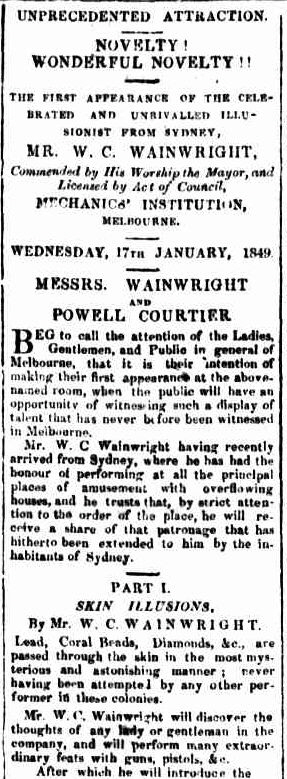
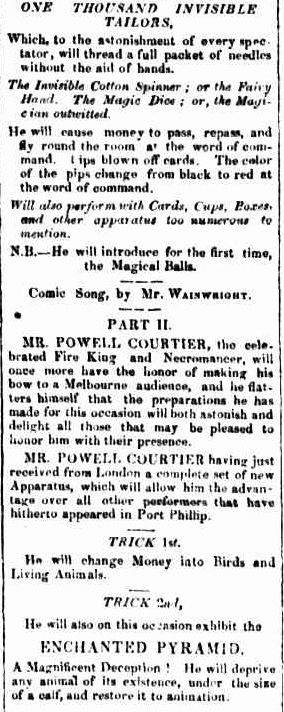
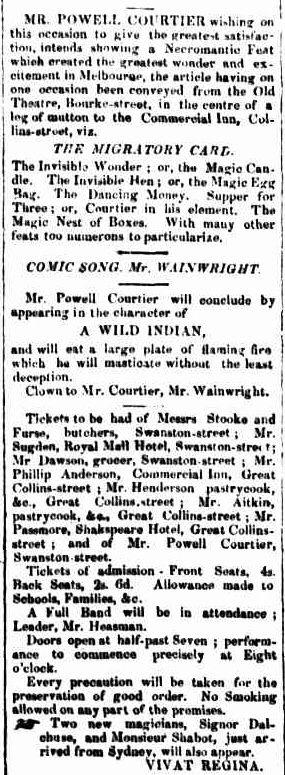
Advertisement from Port Phillip Gazette and Settler’s Journal (Victoria), January 15, 1849
W.C. Wainwright and Powell Courtier - Melbourne, 1849
Mr. Wainwright appears to have developed into a capable performer over the course of just a few years, and it seems reasonable to think that he was giving more entertainments than those of which we have a record.
One apparent performance cannot be reconciled by the dates involved. On face value it would seem that Wainwright had finally broken through the prohibition against performing in the city. “Bell’s Life in Sydney” of January 13, 1849 advertised a lecture on Legerdemain by a Professor Wainwright, at Mr. Gray’s Light-house Hotel on Sussex Street. This attracted a “numerous and select assemblage, who rapturously applauded the magic feats of ‘The Wizard of the South’ [yet another geographical wizard!] Bell’s Life January 20 said, “were Mr. Wainwright to engage a room at the Royal Hotel for one or two evenings, it would give the ultra fashionable suburbites an opportunity of witnessing his wonder-workings.” The suspicion is that ‘Professor Wainwright’ may not have been our magician at all, rather another amateur Wainwright, who seems to have had extensive business and land holdings in Sydney city.
The difficulty with this advertisement is that Mr. William Wainwright had already moved south to Melbourne where, on December 22, 1848, he had written to the Mayor of Melbourne, “Sir, I humbly solicit your pardon for troubling you on this occasion, having just arrived overland from Sydney where I have been performing under a sanction or license (which I now hold) from the Colonial Secretary which License extended to any part of the District of Sydney. I now petition your Worship for permission to perform in this City at the Mechanics Institute those feats of Ledgerdemain [sic] with Mechanical Figures &c. which I have hitherto exhibited with great applause. If your Worship will grant me this favour for a few nights only you will greatly oblige. Your most obdt humbl servt, Wm Wainwright.”
The Mayor, William Montgomerie Bell, was supportive:- “This application must receive its answer from Sydney but I recommend that it should be granted positively for nine nights, under such regulations as may be considered necessary for preserving the public peace & also that authority should be given to the Bench to extend such permission if it sees fit.”
The license approval system was still in place, though approaching the 1850s there was a more relaxed attitude, particularly with the gradual establishment of formal theatres in Sydney. The system, however, would remain for many years, and as late as 1889 the Bulletin magazine was complaining that the powers held by the Colonial Secretary over ‘performances’ extended to such a degree that he could, if he wished, dictate the number of verses permitted to be sung in a hymn during morning church services.
Melbourne in 1849 was still a small community with a population of less than 80,000 (it would exponentially expand with the gold rushes of the 1850s). What was formerly the Port Phillip District, under the government of New South Wales, had been proposed for separation as early as 1840 but it was not until July 1851 that legislation finally took effect and the Colony of Victoria separated from New South Wales. As a result, performers in Melbourne had to communicate with the Sydney-based Colonial Secretary for performing approval.
The Port Phillip Gazette (January 13) announced “The two unrivalled Necromances Messrs. Wainwright and Powell Courtier will make their first appearance at the Mechanics’ Institution [Melbourne Victoria] on Wednesday 17th Instant.”
John Powell Courtier, a Melbourne-based magician and hotelier, was, like Wainwright an ex-convict, and holds the honour of being Australia’s second-earliest known magician. He had only been performing since 1841 but had probably a higher public profile than Wainwright.
On January 16, 1849, the Argus (Melbourne, Victoria) mentions that Messrs. Wainwright and Courtier, “both of whom are well known to the Colonial public as celebrated necromancers” would perform for nine nights at the Mechanics’ Hall. Mr Wainwright is stated to have lately arrived from Sydney. Suddenly Wainwright is billed as “W. C. Wainwright”, and whether this was a genuine part of his name or not, the middle initial does not assist in locating any more information about our magician.
On January 17, Wainwright and Courtier started their season in Melbourne, and Wainwright’s repertoire included passing small items ‘through the skin’, assorted feats with Guns, Pistols etc, and what appears to be mostly smaller items with needles, cards and dice. He also provided comic songs in what the Argus called a ‘splendid voice’, amongst other complimentary remarks (“The feats were performed with a degree of professional skill which would have done credit to the far-famed Signor Blitz, or the more celebrated Wizard of the North.”) Courtier’s magic was of his usual “Fire King” routines. Further performances were made on January 22 and 30, and from a short note on file at the Colonial Secretary’s office, it appears that one of these was a fundraiser for a proposed Benevolent Asylum in Melbourne.
According to the Port Phillip Gazette and Settler’s Journal, February 5, 1849, “the feats performed by Messrs. Powell Courtier and Wainwright … have been the subject of much commendation. On that occasion a numerous party assembled, and all were highly gratified with the evening’s entertainment. Tomorrow evening a series of entertainments will be given in the same place, when the feats are expected to be of the most recherche character. Messrs. Courtier and Wainwright beat the ‘Devil and Dr. Faustus’ hollow.”
Despite this, Mr. Wainwright and his magic are heard from no more in the press, and without any hints as to his other business affairs, his very common name becomes impossible to trace with certainty. Some tantalising references to a Mr. Wainwright acquiring land in Kent Street, Sydney during 1849 are most likely to be another person. Powell Courtier would depart from Australia just six months later, and it is not impossible that Wainwright may have done the same; he had not been transported for life, and was a free man with a new career. Perhaps more news will be discovered over time.
(1) Refer to the Sources guide for this website. The State Archives Collection https://mhnsw.au/archive/subjects/colonial-secretary/ holds original and scanned documents including letters from magicians and other theatrical performers (NRS905 Colonial Secretary’s main series of letters received, 1826-1894), from which these transcripts have been made. See listing below)
Archivist Janette Pelosi’s writings on the Colonial Secretary’s licensing powers is documented in several essays, including “Submitted for Approval of the Colonial Secretary”, published in “A World of Popular Entertainments” [Ed. Gillian Arrighi and Victor Emeljanow, Cambridge Scholars Publishing, 2012.] She draws attention to the names Wright and Wainwright.
(2) Original letter of request 42/4085 - Received June 2 1842. This letter is held next to the Superintendent and Secretary’s letter 42/4268 in the file (Shelf number 4/2587.2)
(4) https://mhnsw.au/indexes/convicts/convicts-index/
NSW State Archives - Convicts Index 1791-1873
NSW State Archives - Convicts Index 1791-1873
Citation: [4/4373; Reel 1011]Entry No: 42/0685 (document shows as 42/685), Date: 9 May 1842
(7) The City of Liverpool and District Historical Society, and https://www.weekendnotes.com/the-lost-pubs-of-liverpool-new-south-wales/
Thomas and Sarah Arundell history: https://mylibrary.liverpool.nsw.gov.au/__data/assets/pdf_file/0009/208674/New-Discoveries-Exhibition-Notes.pdf
List of known letters held at State Archives NSW
NRS905 Colonial Secretary’s main series of letters received, 1826-1894
Derived from the Archives catalogue, and from Joan Reese’s NSW Colonial Secretary’s In Letters Index 1826-1895. Documents sighted either in original or microfilmed form.
Letter Number (CSIL No.) - Shelf Number
42/4268 - 4/2587.2 - held, with this, is Letter 42/4085
43/2599 - 4/4563.3 Reel 2256
43/2809 - 4/4563.3 Reel 2256
43/4424 - 4/4563.3 Reel 2256
43/3452 - 4/2624.1
44/3479 - 4/2655.2 see near end of microfilm reel 2259
44/4045 - 4/2655.2 Reel 2259
44/4455 - 4/2655.2 Reel 2259
44/4944 - 4/2655.2 Reel 2259
44/5191 - 4/2655.2 Reel 2259
44/5573 - 4.2655.2 Reel 2259
44/5977 - 4/2655.2 Reel 2259
46/4214 - 4/2739.7
[46/6837 possibly. Not marked] - Reel 2265 date September 19 1846
48/3965 - 4/2817 - held with this is Letter 48/3159 not listed in catalogues
48/5890 - 4/2813.448/7172 - 4/2813.4
48/8387 - 4/2818 - held with this are letters 48/8415 and 48/7782 unlisted in catalogues
48/8639 - 4/2830.1
48/12848 - 4/2813.4 Reel 2272
48/14163 - 4/2816.4
49/1096 - 4/2862.3 Reel 2276
Certificate of Freedom - Reel 1011 4/4373 Entry 42/0685